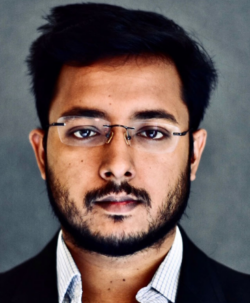We’re delighted that one of our By-Fellows, Dr Ramit Debnath, is helping to design the curriculum for a brand new Design course aimed at developing future interdisciplinary designers. Starting in October 2024, this exciting new course combines architecture, engineering, data science and materials science in one degree.
Ramit has joined the Design Tripos as an Assistant Professor to teach mathematics and programming at the undergraduate level as well as designing the curriculum that includes engineering, maths and hands-on programming experience in statistical interpretation.
My work intends to put people and their opinions at the centre of climate action, and for that, we need the help of design thinking
Ramit first joined Churchill College as a PhD student in 2018. He was then awarded a Sustainability By-Fellowship, which involved shaping the College’s engagement activities related to sustainability and climate action through organising public-facing seminar series and sustainability talks.
Ramit has a background in electrical engineering and environmental social sciences, which shapes his research interests around computational social science, climate change, sustainability, and behavioural change. At Cambridge, Ramit is an Assistant Professor and the inaugural Cambridge Zero Fellow, leading a research group on collective intelligence and design.
We met with Ramit to find out more about the new Design course, including who should apply and why Churchill College is so particularly well suited as a home for potential applicants.

What is the new Design Tripos?
Integrating the arts and sciences, the new Design Tripos course will challenge students to think about global problems such as climate change, inequality, environmental degradation, etc. and equip them with the skills to help create solutions to such challenges. Design thinking is resurfacing as a critical skill needed to solve society’s present challenges, and the Design Tripos will help develop this soft skill along with core engineering and architectural design skills.
Who is this for and how is it distinct?
This is for someone who is passionate about understanding the big picture using design thinking. This course has an intensive focus on mathematics and evidence-driven design to help students make informed decisions, which will eventually equip them to solve real-world problems. This pedagogical emphasis on science-driven design thinking and experiential learning is unique to this course, which makes it distinct from the Architecture or Engineering Tripos.
Design Tripos combines architecture, engineering, data and materials science in one degree, giving you the opportunity to design solutions to environmental and societal challenges. Students will learn how small and large-scale designs such as physical objects, apps, artificial intelligence, electronics or architecture and planning systems can influence people, cultures, economies and the natural world.
The course is structured around a series of core studio projects which will require students to create solutions to real-world problems: from planning stage through to pitching a final product and evaluating user impact. For most projects, you will be working with stakeholders such as clients, end-users and suppliers. Outside of the studio, students will learn about related subjects including design history, philosophy, mathematics, engineering and natural sciences, which will then be applied to their design projects.
What makes this new course different to studying an Architecture or Engineering course?
This new Tripos is cutting-edge and revolutionary as it has a strong emphasis on teaching design thinking from the ground up. The course structure places a strong emphasis on experiential learning, which enables students to test their theories in practical studio sessions. This translational element makes this course exciting as it prepares the students to be job market-ready, which demands holistic thinking and analytical skills. A Design Tripos student will have the skillset to design a new generation of sustainable products or innovative climate action strategies by leveraging data science and AI that are becoming highly attractive to recruiters.
Why choose this course rather than Engineering or Architecture?
This course is structured in a way that empowers students to develop an engineering-centric or architecture-centric profile by choosing appropriate core subjects and electives. This Tripos also has a very strong emphasis on experiential learning and practical translation of design concepts to real world problem solving which are bought in the course very early on, as less common in engineering/architectural course.
Students must have an enthusiasm for both the arts and the sciences. The ability to draw and an interest in the engineering, materials, design and architecture are essential, as is a knowledge of mathematics to at least a A Level standard.
Why is Churchill College so well suited for those considering applying?
At Churchill, we are committed to driving sustainability from the ground up through science communication, public engagement, student-led projects, and College infrastructural redevelopments. The College has dedicated sustainability fellows who oversee the College’s sustainability strategies and ensure that policies are democratically designed to benefit everyone.
The College was awarded East Building of the Year by the Royal Institute of British Architects (RIBA) in 2022 for sustainable design and leadership and we are also establishing an interdisciplinary climate studio that will enable students from all disciplines to work together on interesting real-world projects using design thinking.
What could this course lead to in the form of future career paths?
The interdisciplinary focus of Design means that students will gain the knowledge and skills to be a leader in a range of technical and creative sectors. Depending on the route you take throughout the course, students could pursue a wide variety of careers, from working in manufacturing, to joining the design sector, to starting an entrepreneurial journey. A student could also choose to continue to a PhD in a particular area of the course that interests you, such as intelligent materials, responsible AI or digital twins of cities. If someone would like to develop your professional skills during your degree, optional paid industrial or research summer programmes will be available each year in a variety of different fields.
Where can I find out more?
